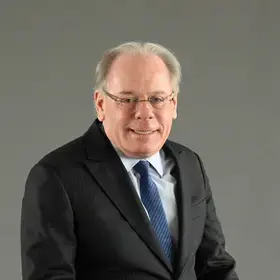By Steven Cohen, Ph.D., Director of the M.S. in Sustainability Management program, School of Professional Studies
With a political transition taking place in a still polarized American political scene, lots of media attention is being paid to the probable end of Biden’s environmental initiatives and the start of Trump’s policy of “drill baby drill.” This is an irresistible story for the news media and social media influencers. It is also not a new story. The ebb and flow of national environmental policy starts even earlier than the transition in 2017 from Obama to Trump. With his state funeral a few days away, I’m reminded of the transition from Jimmy Carter to Ronald Reagan in 1981. During the Carter presidency and the transition to Reagan, I was working at the U.S. Environmental Protection Agency in the Superfund program. Reagan appointed Anne Gorsuch as EPA Administrator and Rita Lavelle as the head of the Superfund program. Everything I was working on was “frozen” by the agency’s new leadership. Seeing the handwriting on the wall, I left the EPA and returned home to New York City, retreating to academia and Columbia University. In 1980, national environmental policy and the U.S. EPA was only a decade old. It was newly placed on the policy agenda, and it wasn’t yet delegated to state and local governments. Environmental protection was a relatively new function of government, and it was not clear it could survive the anti-regulatory ideology of the Reagan revolution. But it did.
Eventually (in April 1985), Lavelle went to jail, Gorsuch was fired, and the first EPA Administrator, moderate Republican Bill Ruckelshaus, returned in 1983 to restore and revive the EPA. Facing reelection in 1984, the Reagan team learned what we all know now: People like to breathe clean air, consume fresh water, and avoid exposure to toxic substances. Environmental regulation may be a partisan political issue, but environmental protection is as American as apple pie.
The move toward environmental sustainability has transcended politics and is now embedded in the culture of the developed world. It benefits from supportive public policy, but it no longer depends on it. My employer, Columbia University, has a Chief Sustainability Officer. Students, staff, and faculty support renewable energy, energy efficiency, and recycling. While the federal government may dismantle the sustainability initiatives established within federal agencies under Biden, they will not be able to dismantle the drive toward environmental sustainability supported and expected by younger government employees. This is the heart of operational sustainability management. It is a paradigm shift or a new understanding of how the world works. It is a change in culture having little to do with politics. Young people in the developed world have grown up on a warming and more crowded planet. When the EPA was created over half a century ago, the world’s human population was 3.7 billion; today, the population has more than doubled and is approaching 8.2 billion. Climate-accelerated extreme weather events have impacted many millions of people, reinforcing the notion that we are living on a warming planet. As the most traveled generation in world history, many young people have seen first-hand the problems of environmental pollution, rapid and unplanned urbanization, and extreme poverty. Whatever their political ideology, they worry about the planet’s ability to provide the resources they and their children will need to live as they do today. Young people expect the organizations they work for and the institutions they pay for to care about the preservation of the planet’s ecosystems.
The governmental home of operational sustainability is local governments around the globe. Mike Bloomberg initiated a global urban partnership, the C40-Cities. Today, it has grown to 97 cities “representing over 22% of the world economy.” In addition to large cities, sustainability is promoted by smaller towns, villages, and communities. Throughout the world’s localities, you see community gardens, bike lanes, energy efficiency, flood-resistant building codes, and organic waste recycling. Here in New York City, we have finally implemented congestion pricing.
The private sector home of operational sustainability management is the best-managed and most profitable corporations. Walmart is the fastest adopter of solar energy in America. Apple has been steadily detoxifying their products while reducing their carbon footprint. Amazon has stopped using little plastic bubbles in their shipping and replaced them with paper packing that is cheaper and less polluting.
Columbia graduates have begun companies like Revel and Voltpost to facilitate the transition to electric vehicles. Both companies are working in partnership with local governments to build commercial vehicle charging infrastructure. Revel has benefited from policies enacted by New York City’s Taxi and Limousine Commission promoting electric cabs and from contracts with the Port Authority to build charging stations at New York airports. According to the Port Authority website:
“The Port Authority and Revel today announced they have broken ground on the installation of 24 electric vehicle (EV) fast chargers at John F. Kennedy International Airport (JFK), more than doubling the airport’s existing electric vehicle charging capacity. The new chargers will be operational in early 2025, available around-the-clock to the public and for-hire vehicles.
The expansion of electric vehicle charging infrastructure at Port Authority facilities is a significant element of the agency’s industry-leading climate efforts. The agency’s wide-ranging net-zero roadmap outlines several concrete steps to achieve the Port Authority’s ambitious goal of net-zero carbon emissions by 2050, including assisting the transition to electric vehicles through widespread and accessible charging infrastructure. JFK is already home to 22 electric vehicle chargers that are frequently used by for-vehicle drivers serving the airport and to the community.”
Voltpost is working to build charging infrastructure directly into light posts on city streets. Reporting on the Canary Media website, Carrie Klein observed that:
“Voltpost, which installed two chargers in New York City…converts lampposts to EV chargers. Its model cuts costs significantly because it doesn’t require digging, said founder Jeff Prosserman, though it does entail upgrading the electrical capacity of streetlights from 120 to 240 volts. That can be done with a single wire bundle that connects to the lamp, Prosserman said, at a cost that’s less than the conventional charger model.”
Both Revel and Voltpost are looking to facilitate the transition to a renewable resource-based economy and are private, for-profit enterprises. They benefit from state and local climate and decarbonization policies but are not dependent on those policies. They are providing a service to urban customers who own electric vehicles but do not live in single-family homes with driveways and garages that can be used to charge their vehicles. Revel also runs an Uber-like fleet of electric ride-share vehicles. When viewed alongside companies like Walmart and Apple, who do not sell sustainability services but do integrate them into operations, we are now seeing the development of what I term private sector operational sustainability management. These are organizations that operate sustainability services, not just talk about them.
These private-sector operations benefit from government action. While it is obvious there will be fewer of these actions at the federal level during the Trump Administration, I see no sign that local governments will retreat from their efforts to integrate environmental sustainability into their operations. In fact, if the past is any guide, without federal action, state and local governments will ramp up their own initiatives.
There is an industry of environmental advocates, social and mass media platforms, and academics that will be focusing our attention on the national retreat from environmental and climate policies. Every electric vehicle plant that reduces output, windmill farm that goes unbuilt, and regulation that is killed or goes unenforced will be highlighted and condemned. Certainly, it would be better if we had a supportive national government. I am not arguing that national environmental policy is unimportant. I simply think that our attention should not simply be focused on the bad news out of Washington. We could call attention to the progress being made in communities and many corporations.
While all these destructive moves by the national government will command our attention, local governments will quietly hum in the background, producing operational rather than symbolic environmental sustainability. The federal government makes policies that take years to become operational. Localities can go from concept to reality much faster. Local governments, like New York City, will require organic waste recycling and will build anaerobic digesters that will transform garbage collection and disposal from an expenditure to a source of revenue. While federal government agencies dismantle sustainability initiatives, private corporations will be working to measure and manage their climate and environmental risks. They will be doing this because it is an element of competent management and will be expected by their investors.
When I began learning about and working on environmental policy in the mid-1970s, the environment was a fringe issue. For some, it was a welcome, consensus-driven alternative to the toxic politics of the war in Vietnam. Today, it is a central issue globally. This reflects how the world has changed over the past half-century and what we have learned about the impact of technology on people and the planet. I believe that we can build a high throughput, environmentally sustainable economy by applying human ingenuity to developing the technologies and management practices needed to simultaneously create wealth while protecting the planet. Furthermore, I believe we have already begun to build that sustainable economy. Its development could be accelerated by an enlightened American federal government, but it will not be stopped by anything that happens in our nation’s capital.
Views and opinions expressed here are those of the authors, and do not necessarily reflect the official position of Columbia School of Professional Studies or Columbia University.
About the Program
The Columbia University M.S. in Sustainability Management program offered by the School of Professional Studies in partnership with the Climate School provides students cutting-edge policy and management tools they can use to help public and private organizations and governments address environmental impacts and risks, pollution control, and remediation to achieve sustainability. The program is customized for working professionals and is offered as both a full- and part-time course of study.



